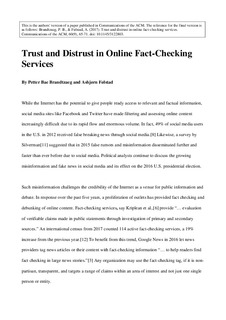| dc.contributor.author | Brandtzæg, Petter Bae | |
| dc.contributor.author | Følstad, Asbjørn | |
| dc.date.accessioned | 2018-01-10T07:54:15Z | |
| dc.date.available | 2018-01-10T07:54:15Z | |
| dc.date.created | 2017-01-14T21:27:08Z | |
| dc.date.issued | 2017 | |
| dc.identifier.citation | Communications of the ACM. 2017, 60 (9), 65-71. | nb_NO |
| dc.identifier.issn | 0001-0782 | |
| dc.identifier.uri | http://hdl.handle.net/11250/2476560 | |
| dc.description.abstract | While the internet has the potential to give people ready access to relevant and factual information, social media sites like Facebook and Twitter have made filtering and assessing online content increasingly difficult due to its rapid flow and enormous volume. In fact, 49% of social media users in the U.S. in 2012 received false breaking news through social media.8 Likewise, a survey by Silverman11 suggested in 2015 that false rumors and misinformation disseminated further and faster than ever before due to social media. Political analysts continue to discuss misinformation and fake news in social media and its effect on the 2016 U.S. presidential election. | nb_NO |
| dc.language.iso | eng | nb_NO |
| dc.title | Trust and distrust in online fact-checking services | nb_NO |
| dc.type | Journal article | nb_NO |
| dc.type | Peer reviewed | nb_NO |
| dc.description.version | acceptedVersion | nb_NO |
| dc.source.pagenumber | 65-71 | nb_NO |
| dc.source.volume | 60 | nb_NO |
| dc.source.journal | Communications of the ACM | nb_NO |
| dc.source.issue | 9 | nb_NO |
| dc.identifier.doi | 10.1145/3122803 | |
| dc.identifier.cristin | 1427382 | |
| dc.relation.project | EU/610928 | nb_NO |
| cristin.unitcode | 7401,90,12,0 | |
| cristin.unitname | Nettbaserte systemer og tjenester | |
| cristin.ispublished | true | |
| cristin.fulltext | postprint | |
| cristin.qualitycode | 2 | |
